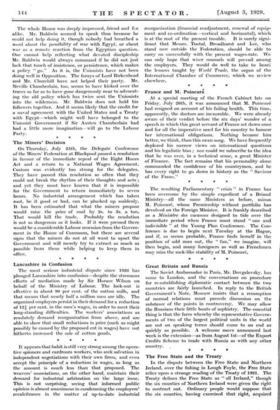It appears that habit is still very strong among the
opera- tive spinners and cardroom workers, who seek salvation in independent negotiations with their own firms, and even accept the principle of a reduction in wages, as long as the amount is much less than that proposed. The Weavers' associations, on the other hand, maintain their demand for industrial arbitration on the large issue. This is not surprising, seeing that informed public opinion is almost unanimous in condemning the employers' recalcitrance in the matter of up-to-date industrial reorganization (financial readjustment, renewal of equip- ment and co-ordination—vertical and horizontal), which is at the root of the present trouble. It is surely signi- ficant that Messrs. Tootal, Broadhurst and Lee, who stand now outside the Federation, should be able to carry on successfully with the present wages-rate. We can only hope that wiser counsels will prevail among the employers. They would do well to take to heart the lessons taught by World Trade, the organ of the International Chamber of Commerce, which we review elsewhere.
*


































 Previous page
Previous page